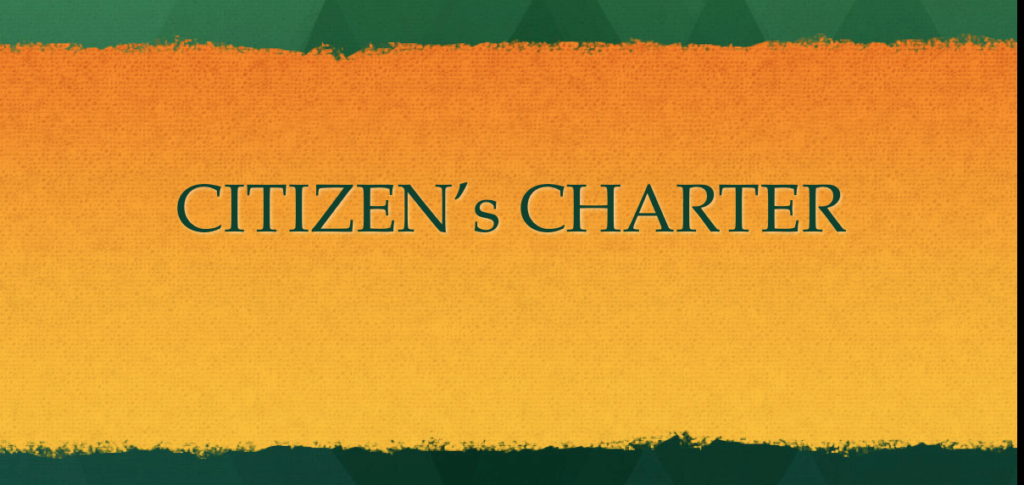Transparency, accountability and responsiveness of the administration are the three basic characteristics of good governance. Citizen Charter is an initiative to make administration both accountable and citizen-friendly.
Historical Background:
Citizen’s Charter was first launched in U.K. by John Major in 1991 through Citizen Charter Mark Award. In India, a Conference of Chief Secretaries was held in 1996 in New Delhi to develop ‘An Agenda for Effective and Responsive Administration’.The major recommendations emerging from this Conference were the following:
- Public accountability should be interpreted in a broader sense to include public satisfaction and responsive delivery of public services;
- The Citizen’s Charters should be introduced phase-wise for as many service institutions as possible;
- The Citizen’s Charters should be introduced in the Departments of the Central and State Governments starting with those with a large public interface.
Consequently, in December 1996, the first directive of the Union Government to the Ministries/Departments to initiate the exercise of formulation of Citizen’s Charters was issued. In May 1997, the Conference of Chief Ministers was held in New Delhi adopting an ‘Action Plan on Effective and Responsive Government’. A major decision taken as a part of this Action Plan was to formulate Citizen’s Charters both at the Centre and the States, beginning with the government departments and agencies with large public interface, such as the Indian Railways, Department of Posts, etc.
The Department of Administrative Reforms and Public Grievances of the Union Government has been coordinating formulation, operationalisation and evaluation of the Citizen’s Charters of the Union Ministries/Departments and other Central Government organisations.
What is a Citizen ‘s Charter?
The Citizen’s Charter is a written, voluntary declaration by service providers about their service standards, choice, accessibility, non-discrimination, transparency and accountability. It should be in accord with the expectations of citizens. Therefore, it is a useful way of defining with the stakeholders what service should be and what standards to expect.
Objectives of Citizen ‘s Charter:
- Transparency and accountability
- Improved service delivery through setting of standards, improvement in quality and more responsive attitude.
- Value for the taxpayer
Principles:
- Conformance to standards
- Stakeholder Involvement
- Continuous Improvement
Components of a Citizen’s Charter:
A good Citizen’s Charter should have the following components :-
- Vision and Mission Statement of the Organisation
- Details of Business transacted by the Organisation
- Details of ‘Citizens’ or ‘Clients’
- Statement of services including standards, quality, time frame etc. provided to each Citizen/ Client group separately and how/ where to get the services
- Details of Grievance Redress Mechanism and how to access it
- Expectations from the ‘Citizens’ or ‘Clients’
- Additional commitments such as compensation in the event of failure of service delivery.
2nd ARC: Recommendations:
Recommendations:
- a. Citizens’ Charters should be made effective by stipulating the service levels and also the remedy if these service levels are not met.
- b. Citizens may be involved in the assessment and maintenance of ethics in important government institutions and offices.
- c. Reward schemes should be introduced to incentivise citizens’ initiatives.
- d. School awareness programmes should be introduced, highlighting the importance of ethics and how corruption can be combated.
Problems in Citizen’s Charter implementation:
- Citizen’s Charters have still not been adopted by all Ministries/ Departments/ Organisations in the Government/State Governments of India.
- The Citizen’s Charter is not legally enforceable and, therefore, is non-justiciable.
- The exercise remains more of a ritualistic exercise without generating any capacity for people to use Charter commitments to obtain service improvement or for fulfillment of organisational commitments.
Way Ahead:
- Orientation & training to staff about ideals, objectives & process of Citizen Charter.
- Public Awareness Campaigns to inform citizen about the benefits & effective use of citizen charter
- Creation of Database on consumer Grievances
- Built in mechanism for monitoring, evaluating & reviewing needs to be developed.
- Participation with stakeholders including citizens, civil society organisations, NGO’s etc.
- Regular & persistent efforts to bring about a change in attitude.
References:
- 2nd ARC Report: Ethics in Governance – Chapter 5
- IIPA Report
- Citizen Charter: FAQ’s

